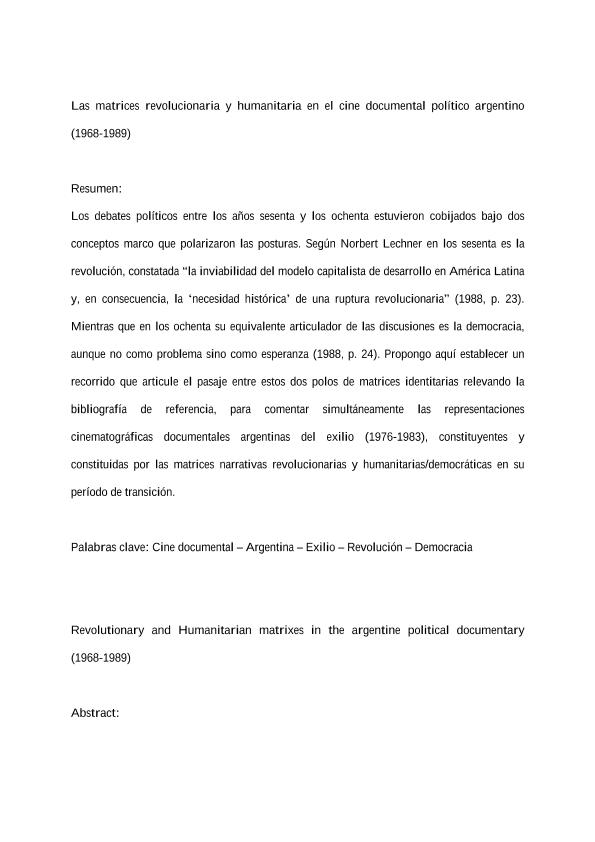Mostrar el registro sencillo del ítem
dc.contributor.author
Campo, Javier Alberto

dc.date.available
2018-01-19T20:08:42Z
dc.date.issued
2014-01
dc.identifier.citation
Campo, Javier Alberto; Las matrices revolucionaria y humanitaria en el cine documental político argentino (1968-1989); Universidad de Guadalajara. Departamento de Historia; El ojo que piensa; 5; 9; 1-2014; 1-20
dc.identifier.issn
2007-4999
dc.identifier.uri
http://hdl.handle.net/11336/34014
dc.description.abstract
Los debates políticos entre los años sesenta y los ochenta estuvieron cobijados bajo dos conceptos marco que polarizaron las posturas. Según Norbert Lechner en los sesenta es la revolución, constatada "la inviabilidad del modelo capitalista de desarrollo en América Latina y, en consecuencia, la 'necesidad histórica' de una ruptura revolucionaria" (1988, p. 23). Mientras que en los ochenta su equivalente articulador de las discusiones es la democracia, aunque no como problema sino como esperanza (1988, p. 24). Propongo aquí establecer un recorrido que articule el pasaje entre estos dos polos de matrices identitarias relevando la bibliografía de referencia, para comentar simultáneamente las representaciones cinematográficas documentales argentinas del exilio (1976-1983), constituyentes y constituidas por las matrices narrativas revolucionarias y humanitarias/democráticas en su período de transición.
dc.description.abstract
Political debates between the sixties and the eighties were sheltered under two headings which polarized positions. For Norbert Lechner in the sixties is the revolution, observed "the infeasibility of the capitalist model of development in Latin America and, consequently, the 'historical necessity' of a revolutionary rupture" (1988: 23). While in the eighties equivalent articulator of the discussions is democracy, but not as a problem but as hope (1988: 24). I propose here to establish a route that links the passage between these two poles of identity matrices relieving the literature reference, to comment simultaneously Argentine documentary film representations of exile (1976-1983), and constituent revolutionary and humanitarian / democratic narratives in its transition period.
dc.format
application/pdf
dc.language.iso
spa
dc.publisher
Universidad de Guadalajara. Departamento de Historia
dc.rights
info:eu-repo/semantics/openAccess
dc.rights.uri
https://creativecommons.org/licenses/by-nc-sa/2.5/ar/
dc.subject
Argentina
dc.subject
Documental
dc.subject
Exilio
dc.subject
Democracia
dc.subject.classification
Periodismo

dc.subject.classification
Comunicación y Medios

dc.subject.classification
CIENCIAS SOCIALES

dc.title
Las matrices revolucionaria y humanitaria en el cine documental político argentino (1968-1989)
dc.type
info:eu-repo/semantics/article
dc.type
info:ar-repo/semantics/artículo
dc.type
info:eu-repo/semantics/publishedVersion
dc.date.updated
2018-01-18T21:40:20Z
dc.identifier.eissn
1665-7047
dc.journal.volume
5
dc.journal.number
9
dc.journal.pagination
1-20
dc.journal.pais
México

dc.journal.ciudad
Guadalajara
dc.description.fil
Fil: Campo, Javier Alberto. Consejo Nacional de Investigaciones Científicas y Técnicas; Argentina
dc.journal.title
El ojo que piensa
dc.relation.alternativeid
info:eu-repo/semantics/altIdentifier/url/http://www.elojoquepiensa.net
dc.relation.alternativeid
info:eu-repo/semantics/altIdentifier/url/http://www.elojoquepiensa.cucsh.udg.mx/index.html
Archivos asociados
